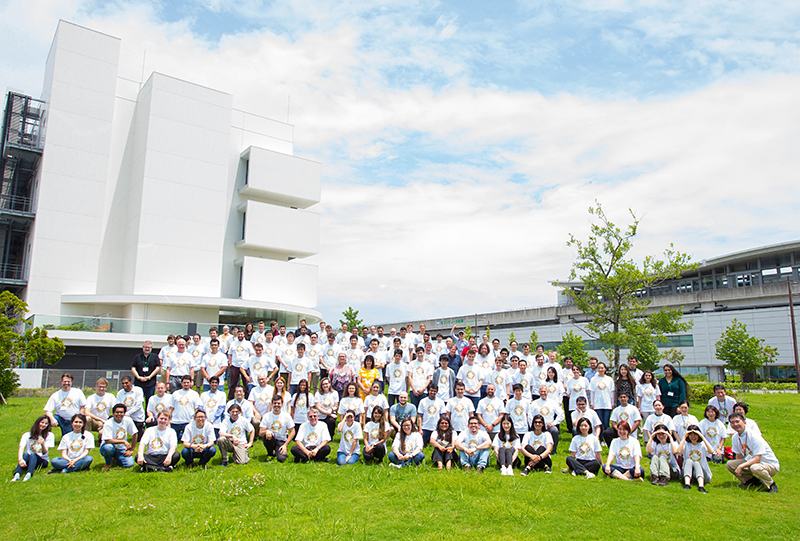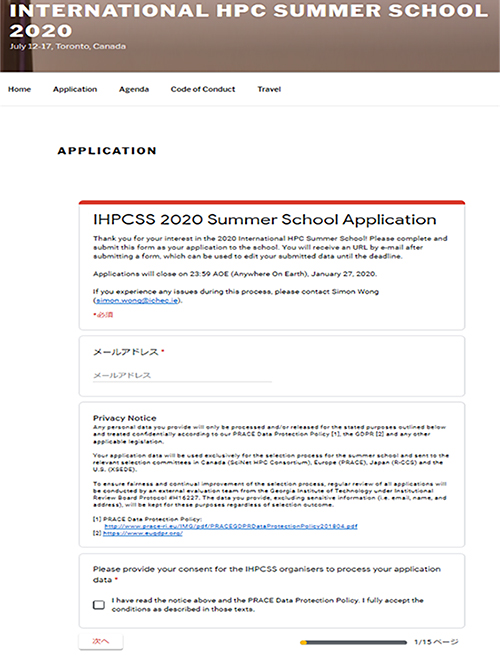トップページ
 イベント・広報
イベント・広報
 学生・若手研究者向けイベント
学生・若手研究者向けイベント
 【※開催中止】日欧米カナダ共同の International HPC Summer School 2020 参加者募集(2020年7月12日~17日・カナダ、トロント)
【※開催中止】日欧米カナダ共同の International HPC Summer School 2020 参加者募集(2020年7月12日~17日・カナダ、トロント)
【※開催中止】日欧米カナダ共同の International HPC Summer School 2020 参加者募集(2020年7月12日~17日・カナダ、トロント)
English ※開催中止について
新型コロナウイルス感染症(COVID-19)の国内外での感染拡大リスクが高まっていることから、ご参加の皆さまおよび関係者の健康面への影響を考慮し、予定をしておりました本スクールは、中止とすることを決定いたしました。
なお、次年度は2021年7月にカナダ・トロントでの開催を予定しております。何卒ご了承ください。
計算科学研究センターでは今年も、欧州、米国及びカナダと共同でサマースクールを開催するにあたり、参加者を募集します。
日本からは、博士研究員などの若手研究者を概ね10名派遣予定です。ご希望の方は、下記詳細をご確認いただき、International HPC Summer School(IHPCSS)のウェブサイト![]() 経由で参加申込みを行ってください。
経由で参加申込みを行ってください。

| 開催日 | 2020年7月12日(日) - 17日(金) |
|---|---|
| 開催都市 | カナダ トロント |
| 主催 |
|
| 対象 | 日欧米カナダの学生、博士研究員などの若手研究者(80名程度)
|
| 申し込み | 詳細情報及び参加申し込み |
| 登録締切 | 2020年1月27日(月) ※個人情報の取扱について R-CCSでは、「理化学研究所個人情報保護規程」(281KB) |
目的
この国際サマースクールの目的は、通常、特定分野に特化して研究を行っている学生及び若手研究者を対象に、HPC関連分野の第一線の研究者による講義や実習を通して、より広い視点で新たな知見を得る機会を提供することです。さらに、同世代間の国際交流を深め、今後のHPC分野の発展を担う国際的人材の育成、輩出をめざします。
これまで、欧州と米国で"European-U.S. Summer School on HPC Challenges in Computational Sciences"が3回開催され、その後、2013年に日本が、そして2014年にはカナダも参画し、今年は"11th International Summer School on HPC Challenges in Computational Sciences"を開催します。
※HPC…ハイパフォーマンスコンピューティング
内容
日欧米カナダのハイパフォーマンスコンピューティング(HPC)の最前線にいる研究者による、以下のトピックに関する講義や実習を予定。
- ハイパフォーマンスコンピューティングおよびビックデータチャレンジ
- ハイパフォーマンスコンピューティングプログラミング
- 性能解析やプロファイリング
- ソフトウエアエンジニアリング
- 数値ライブラリ
- ビッグデータ分析や分析論
- ディープラーニング(人工知能ならびに深層学習技術)
- 科学的可視化(科学的成果の可視化技術)
- 日欧米カナダのハイパフォーマンスコンピューティングインフラストラクチャーの紹介
【参考】参加申込登録ページ
◆Research Abstract
Our research topic is radiation protection using Martian magnetic anomalies. To validate the concept of the radiation protection, we have conducted particle simulation to measure how the magnetic anomalies affect the impact rate on the Martian surface. We simulated numerous particle trajectories in the magnetic anomaly using relativistic Buneman-Boris method. The particle simulation handle trajectories of about 1 billion protons. To calculate numerous particles, we constructed simulation program using massive parallelism by MPI and have performed the simulation on the KDK computer system.
◆Scientific and technological reasons for participating
We have conducted particle simulation parallelized by MPI. However, I studied the parallelism by reading articles on the website mainly and was not taught by professionals of the massive parallelism. Therefore, I would like to study accurate high performance computing skills including the massive parallelism in the summer school. Moreover, these skills are useful for me as a Ph.D. candidate. Then, our research topic will be plasma particle simulation of magnetic nozzle thrusters in space. The particle simulation of magnetic nozzle thrusters has been rarely done so far, because the calculation cost would be huge. To overcome the calculational issues of magnetic nozzle thrusters, I would like to study basic and advanced skills about high performance computing.
◆Describe your use of HPC, including familiarity with MPI, OpenMP, multicore, accelerators and
coprocessors, and how you participate in software development.in this summer school.
I conducted particle simulation of electrospray thrusters from Month. Year to Month. Year and particle simulation of radiation protection using Martian magnetic anomalies from Month. Year to today. The particle simulation included MPI parallelization and was performed on the JAXA Supercomputer System generation 2 (JSS2) and the KDK computer system. I will conduct particle simulation of magnetic nozzle thrusters using HPC and MPI from Month. Year.
◆List any awards, scholarships, patents, relevant publications, etc.
Awards:
-Award for Outstanding Academic Performance, 〇〇 University, Month. Year.
-○○-award, The Japan Society of Mechanical Engineers, Month. Year.
Scholarship:
-Scholarship student, ○○ Scholarship Foundation
Publications:
-Name“Title”, Japan, Date (Year), pp.
◆List any engagement you have in your community beyond the classroom (i.e. research lab positions, leadership positions, committees, outreach activities, etc).
-Tutor for international student, 〇〇 University, Month.Year-Month.Year.
-Special Inter-Institutional Research Fellow, 〇〇, 〇〇 Agency, Month.Year-Month.Year.
-Student member of editorial board, 〇〇, Month.Year-Today.
◆How could your lab, department, and/or larger community benefit from you attending this summer school?
Attending the summer school will be benefit for our laboratory of 〇〇 University. Our laboratory focuses on space electric propulsion and have conducted plasma particle simulation of microwave plasma thrusters and molecular dynamics simulation of electrospray thrusters. These simulations use HPC, such as the KDK computer system at 〇〇 University. I will spread the experience studying in the summer school.
問い合わせ先
理化学研究所 計算科学研究推進室
担当:佐々木 久子
※[at]を@に変更してください
 renkei_hrd[at]ml.riken.jp
renkei_hrd[at]ml.riken.jp 078-940-5796
078-940-5796- FAX 078-304-4956
(2020年5月29日)


